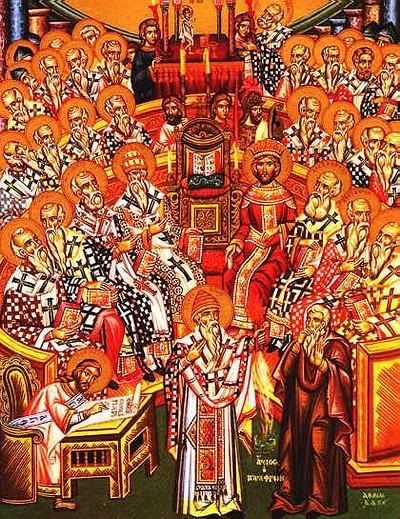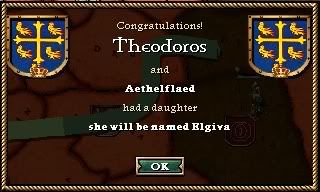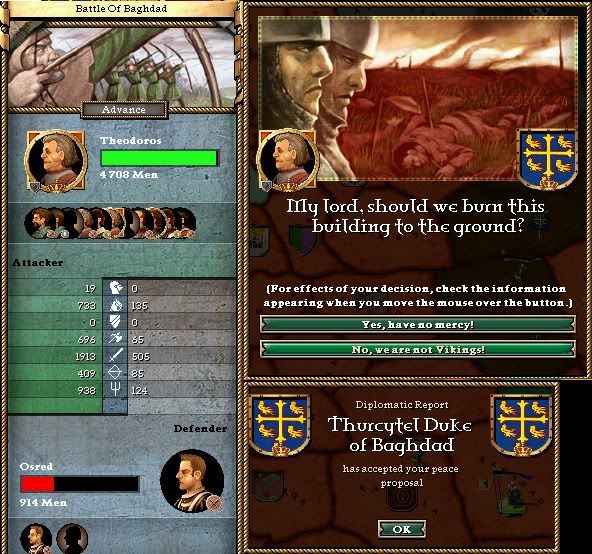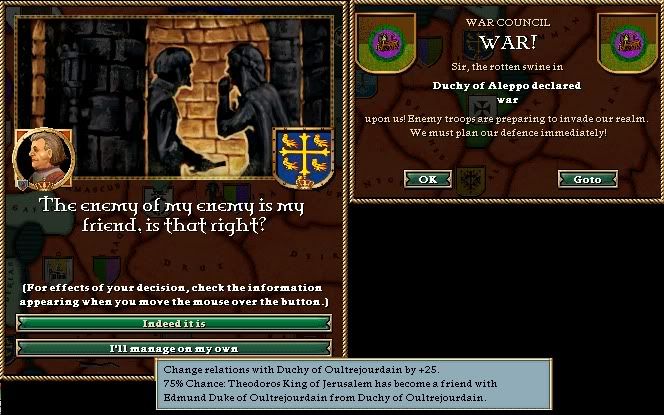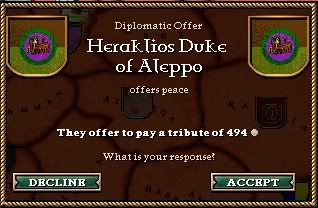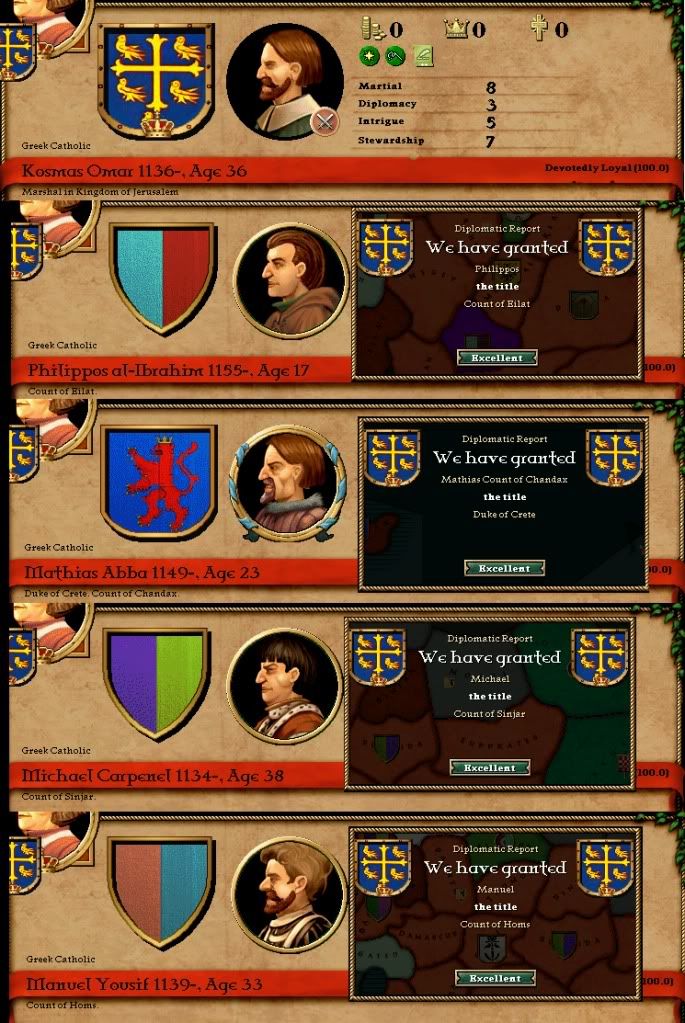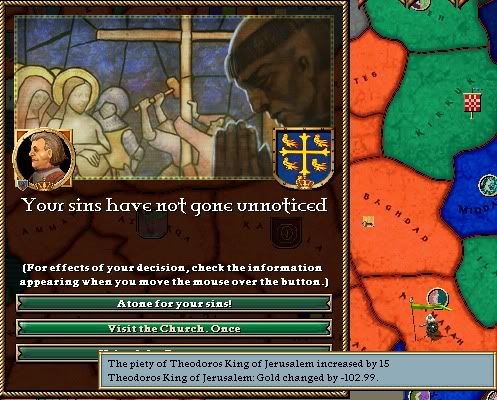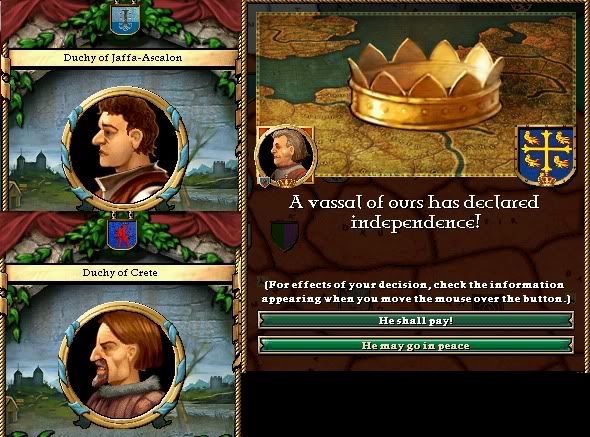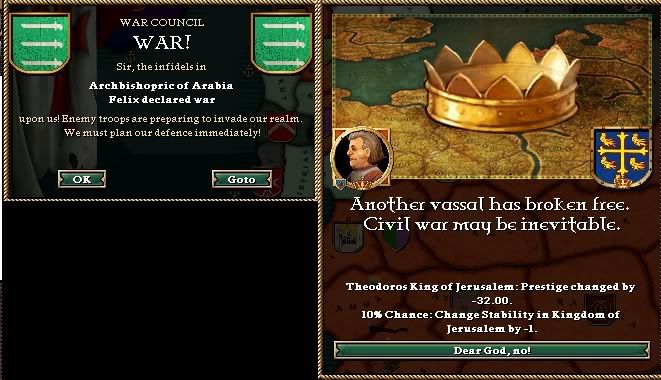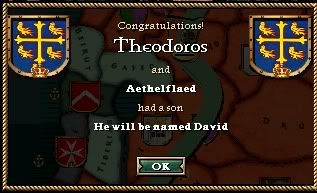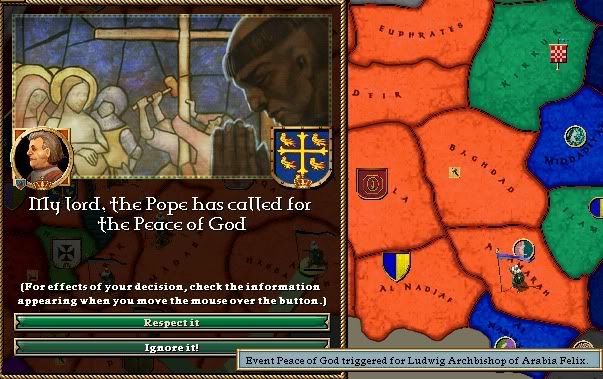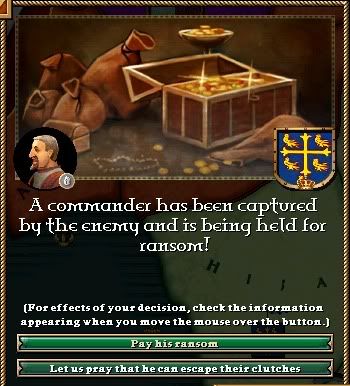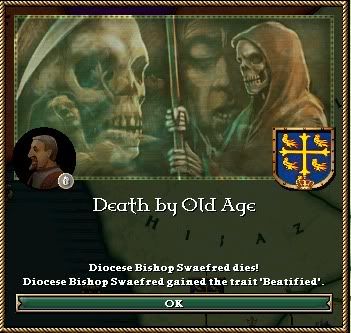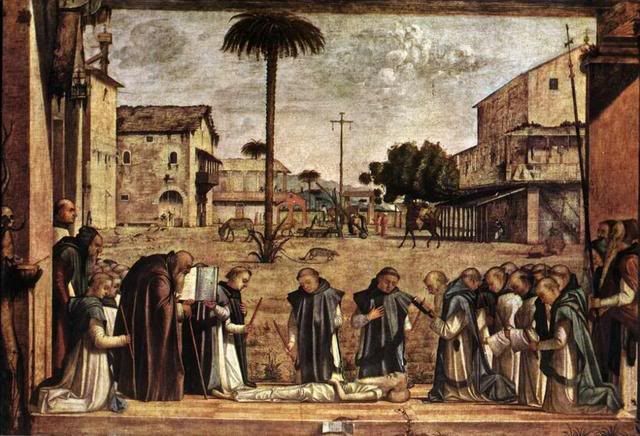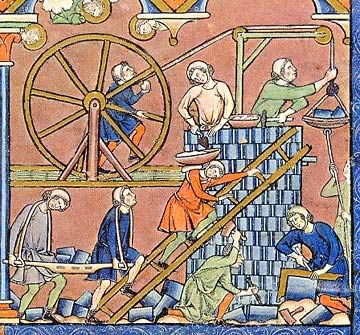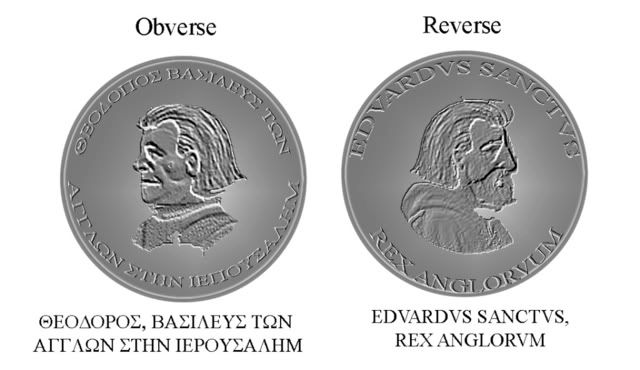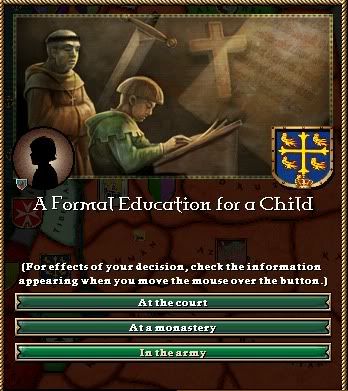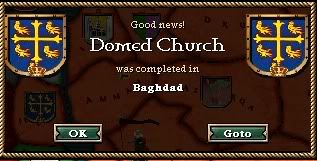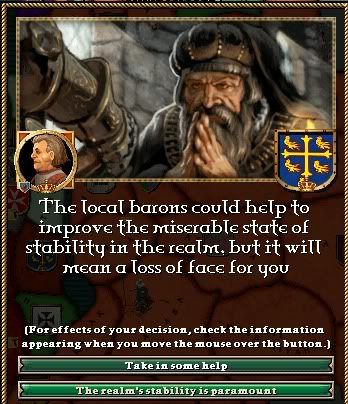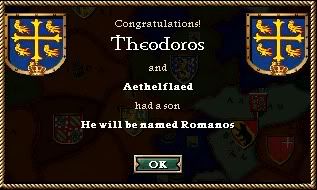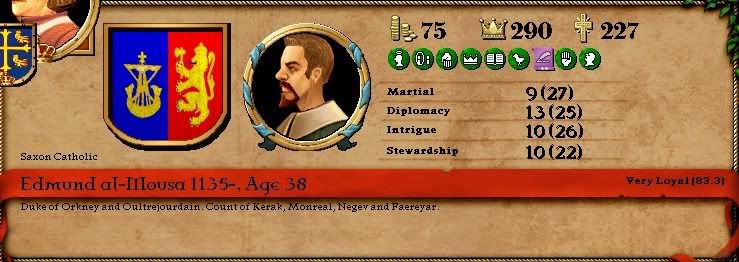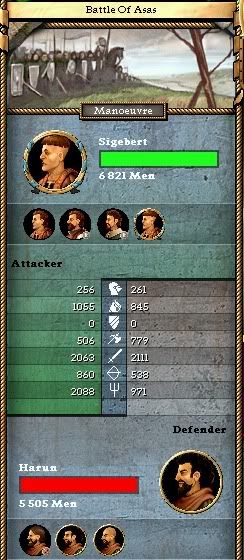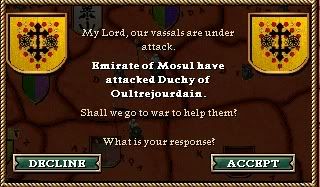The Reign of Theodorus I, part 9
From the Royal Archives, Jerusalem:
September 5th, 1168
Marshal Eadwig to King Theodorus:
We have reached the African shore with little resistance from the heathens. Even now we are besieging their fortifications, which are rudimentary and will fall quickly. Casualties on the voyage were low, but several ships are unaccounted for.

October 2nd, 1168
Caliph Usama Abolhassan to King Theodorus:
Your terms for peace are acceptable. We will cede our Syrian estates, and your armies which fight with the strength of ten men will leave our shores. If Allah wills it, we may meet again on the field of battle, but for now, I salute you as a worthy foe.

October 21st, 1168
Nard, Bishop of Beirut to King Theodorus:
As you continue to honour the Bishop of Jerusalem, and obey blindly the honeyed words he pours into your ears, I perceive that you are not your own man, but a pawn of that greedy cleric. The Blessed Pope Anastasius IV has many times reminded you of the autonomy of this see, but your sheriffs insist on the levying of men and collection of taxes from the towns of Galilee. No longer will your servants be allowed to enter this bishopric, and wherever the authority of this see extends, the royal writ will no longer run. Be assured that I have the support of His Holiness in this matter.
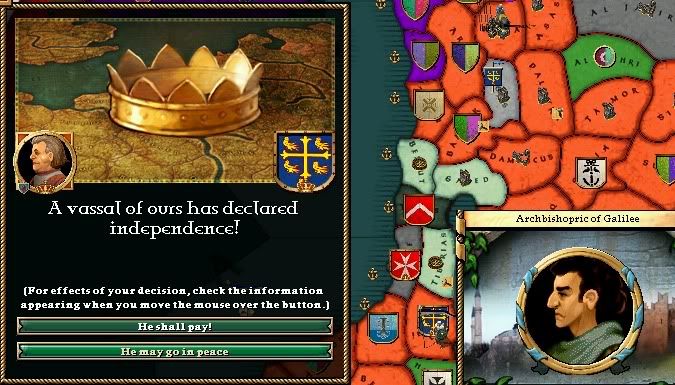
November 2nd, 1168
Bishop Swaefred to the Lady Godfigu:
I am anxious for the survival of the kingdom, and worry at the King’s ability. It appears that despite both our efforts, the King lacks many of the skills we need in a leader at this time. He clearly blunders into affairs of state with little regard for the consequences, and his skills of rhetoric leave much to be desired. Moreover, it is widely known that he lacks the taste for battle, and is often found ‘directing the action’ far away from the sounds of mêlée and combat. I pray that the Lord gives him the wisdom to continue to entrust the affairs of state to you, for he dearly needs good counsel, and I feel too weak in my old age to continue to give it.

March 6th, 1169
Walfnoth de Monreal to King Theodorus:
The war in Africa continues badly. The men are restless and desire to return home, while the heathens here are better prepared than those we encountered before. We must receive more men and supplies, lest we all perish in this God-forsaken land. Were your majesty able to make the journey himself, it would hearten all our spirits greatly. The men-at-arms, as suspicious as ever, are starting to whisper that your majesty has abandoned as a sacrifice to the demon-worshipers.
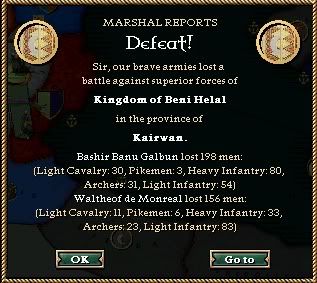
July 13th, 1169
Royal decree issued in Jerusalem:
Let it be known that Yves, Grandmaster of the Knights of the Temple, has been expelled from the community of the Holy Church, having violated the sacred trust placed in him by attempting to cause disorder in the city. The unsuccessful attempt by several pilgrim knights to loot the Royal Treasury and seize control of the palace has been traced to the Grandmaster himself. All assests of the Order within the City have are hereby seized by order of the King, and the Order expelled from the city until further notice. Anyone found harbouring a knight is to be brought before the chief justice for punishment.

September 14th, 1169
King Theodorus to Bishop Swaefred:
Your repeated appeals for me to take holy orders and travel to Rome are no doubt well-intentioned, but impossible for me to fulfill. The war in Africa consumes too many resources as it is, and for me to lead the English to Iberia would only drain more silver from my coffers. I am also aware that my many enemies at home would dearly like to see me depart from these shores, for they would seize my throne before it was even cold.

November 19th, 1169
Edward de Montgomery, Duke of Lancaster to Queen Aethelflaed:
Dearest Cousin, I am saddened to report the death of our dear Grandfather to you. Your father and I were, of course, the main beneficiaries of his will, but we miss you greatly, and will tend to your estates here in England. Please send us news of your son John, for both your father and I remain without children, and he may one day be very important to this family.
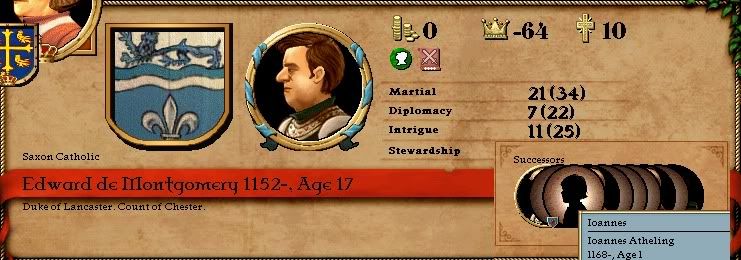
February 8th, 1170
Emperor Alexander to King Theodorus:
As one monarch to another, I implore you to send what assistance you can, be it men or silver, before the lands of Greece are overrun by infidels. Just as you are engaged in a struggle against the African heathens, I too am waging war in my own lands. Many of my castles in Epirus, Thessaly and Macedonia are now in their hands, and it may only be a matter of time before the City of Constantinople itself is threatened. The future of the Word of God in these lands may be at stake; if you ignore our peril now, it will be your kingdom which falls next.
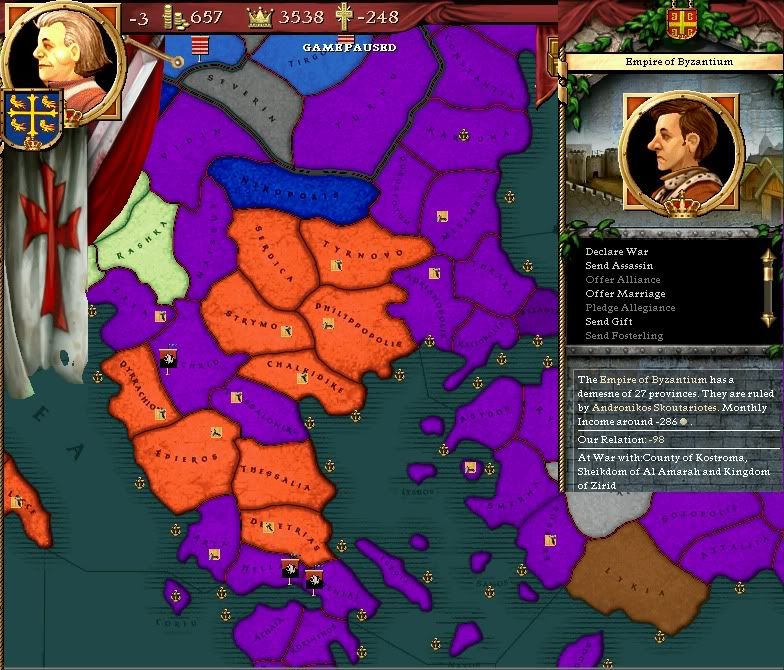
April 10th, 1170
Duke Harold of Jaffa to King Theodorus:
The war in Africa continues, and we are no closer to defeating the infidels. Your sheriffs collect taxes with little regard for the law, and yet we see nothing to account for such prolific spending. Everyone regards you as a failure of a King, both a tyrant and a coward, and there will be few tears shed when I remove the crown from your head.

June 24th, 1170
Proclamation to the People of Jerusalem on behalf of Duke Harold:
The King has been put to flight and his armies scattered! You are free from his tyrannical ways, for God has granted me authority over this city, and soon also the Kingdom!
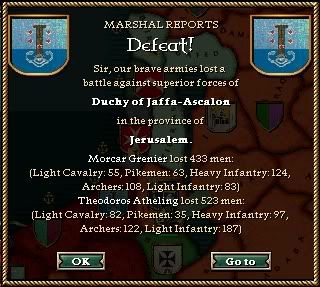
July 23rd, 1170
King Rafiq of the Beni Halal to King Theodorus:
Those men you sent to my lands lie dead in the sands, but I am great and I am merciful. You may keep those castles which you have seized from me in Syria, and may Allah grant you the wisdom to never visit these shores again.

August 1st, 1170
Duke Thurcytel of Baghdad to Harold of Jaffa:
I applaud your efforts to depose this weak and effeminate Greek who calls himself our King. My men stand will stand with yours, and may God grant us victory.

October 17th, 1170
Queen Aethelflaed to the Castellan, Jerusalem
One of my ladies-in-waiting has given birth to a son, though she swears ignorance as to the father’s identity. Make arrangements for him to be raised by a palace servant, far from the King’s eyes.
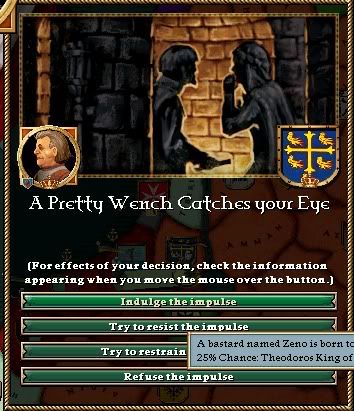
November 12th, 1170
King Theodorus to Morcar, Duke of Jaffa
My brother-in-law Harold has been defeated in battle and his lands confiscated. Your family still commands much influence in these lands, and thus I turn to you. In the Kingdom’s hour of need, I embrace you as a friend, and hope that you can use this opportunity to wipe the stain of treachery from your character. As the Lord instructs us, I grant you the chance for redemption. Do not waste it.

Chapter 42 – The Reign of Theodorus I, part 9
1168 – 1170
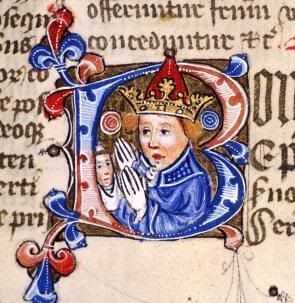
The King’s Authority Continues to Wane
1168 – 1170

The King’s Authority Continues to Wane
From the Royal Archives, Jerusalem:
September 5th, 1168
Marshal Eadwig to King Theodorus:
We have reached the African shore with little resistance from the heathens. Even now we are besieging their fortifications, which are rudimentary and will fall quickly. Casualties on the voyage were low, but several ships are unaccounted for.

October 2nd, 1168
Caliph Usama Abolhassan to King Theodorus:
Your terms for peace are acceptable. We will cede our Syrian estates, and your armies which fight with the strength of ten men will leave our shores. If Allah wills it, we may meet again on the field of battle, but for now, I salute you as a worthy foe.

October 21st, 1168
Nard, Bishop of Beirut to King Theodorus:
As you continue to honour the Bishop of Jerusalem, and obey blindly the honeyed words he pours into your ears, I perceive that you are not your own man, but a pawn of that greedy cleric. The Blessed Pope Anastasius IV has many times reminded you of the autonomy of this see, but your sheriffs insist on the levying of men and collection of taxes from the towns of Galilee. No longer will your servants be allowed to enter this bishopric, and wherever the authority of this see extends, the royal writ will no longer run. Be assured that I have the support of His Holiness in this matter.

November 2nd, 1168
Bishop Swaefred to the Lady Godfigu:
I am anxious for the survival of the kingdom, and worry at the King’s ability. It appears that despite both our efforts, the King lacks many of the skills we need in a leader at this time. He clearly blunders into affairs of state with little regard for the consequences, and his skills of rhetoric leave much to be desired. Moreover, it is widely known that he lacks the taste for battle, and is often found ‘directing the action’ far away from the sounds of mêlée and combat. I pray that the Lord gives him the wisdom to continue to entrust the affairs of state to you, for he dearly needs good counsel, and I feel too weak in my old age to continue to give it.

March 6th, 1169
Walfnoth de Monreal to King Theodorus:
The war in Africa continues badly. The men are restless and desire to return home, while the heathens here are better prepared than those we encountered before. We must receive more men and supplies, lest we all perish in this God-forsaken land. Were your majesty able to make the journey himself, it would hearten all our spirits greatly. The men-at-arms, as suspicious as ever, are starting to whisper that your majesty has abandoned as a sacrifice to the demon-worshipers.

July 13th, 1169
Royal decree issued in Jerusalem:
Let it be known that Yves, Grandmaster of the Knights of the Temple, has been expelled from the community of the Holy Church, having violated the sacred trust placed in him by attempting to cause disorder in the city. The unsuccessful attempt by several pilgrim knights to loot the Royal Treasury and seize control of the palace has been traced to the Grandmaster himself. All assests of the Order within the City have are hereby seized by order of the King, and the Order expelled from the city until further notice. Anyone found harbouring a knight is to be brought before the chief justice for punishment.

September 14th, 1169
King Theodorus to Bishop Swaefred:
Your repeated appeals for me to take holy orders and travel to Rome are no doubt well-intentioned, but impossible for me to fulfill. The war in Africa consumes too many resources as it is, and for me to lead the English to Iberia would only drain more silver from my coffers. I am also aware that my many enemies at home would dearly like to see me depart from these shores, for they would seize my throne before it was even cold.

November 19th, 1169
Edward de Montgomery, Duke of Lancaster to Queen Aethelflaed:
Dearest Cousin, I am saddened to report the death of our dear Grandfather to you. Your father and I were, of course, the main beneficiaries of his will, but we miss you greatly, and will tend to your estates here in England. Please send us news of your son John, for both your father and I remain without children, and he may one day be very important to this family.

February 8th, 1170
Emperor Alexander to King Theodorus:
As one monarch to another, I implore you to send what assistance you can, be it men or silver, before the lands of Greece are overrun by infidels. Just as you are engaged in a struggle against the African heathens, I too am waging war in my own lands. Many of my castles in Epirus, Thessaly and Macedonia are now in their hands, and it may only be a matter of time before the City of Constantinople itself is threatened. The future of the Word of God in these lands may be at stake; if you ignore our peril now, it will be your kingdom which falls next.

April 10th, 1170
Duke Harold of Jaffa to King Theodorus:
The war in Africa continues, and we are no closer to defeating the infidels. Your sheriffs collect taxes with little regard for the law, and yet we see nothing to account for such prolific spending. Everyone regards you as a failure of a King, both a tyrant and a coward, and there will be few tears shed when I remove the crown from your head.

June 24th, 1170
Proclamation to the People of Jerusalem on behalf of Duke Harold:
The King has been put to flight and his armies scattered! You are free from his tyrannical ways, for God has granted me authority over this city, and soon also the Kingdom!

July 23rd, 1170
King Rafiq of the Beni Halal to King Theodorus:
Those men you sent to my lands lie dead in the sands, but I am great and I am merciful. You may keep those castles which you have seized from me in Syria, and may Allah grant you the wisdom to never visit these shores again.

August 1st, 1170
Duke Thurcytel of Baghdad to Harold of Jaffa:
I applaud your efforts to depose this weak and effeminate Greek who calls himself our King. My men stand will stand with yours, and may God grant us victory.

October 17th, 1170
Queen Aethelflaed to the Castellan, Jerusalem
One of my ladies-in-waiting has given birth to a son, though she swears ignorance as to the father’s identity. Make arrangements for him to be raised by a palace servant, far from the King’s eyes.

November 12th, 1170
King Theodorus to Morcar, Duke of Jaffa
My brother-in-law Harold has been defeated in battle and his lands confiscated. Your family still commands much influence in these lands, and thus I turn to you. In the Kingdom’s hour of need, I embrace you as a friend, and hope that you can use this opportunity to wipe the stain of treachery from your character. As the Lord instructs us, I grant you the chance for redemption. Do not waste it.




